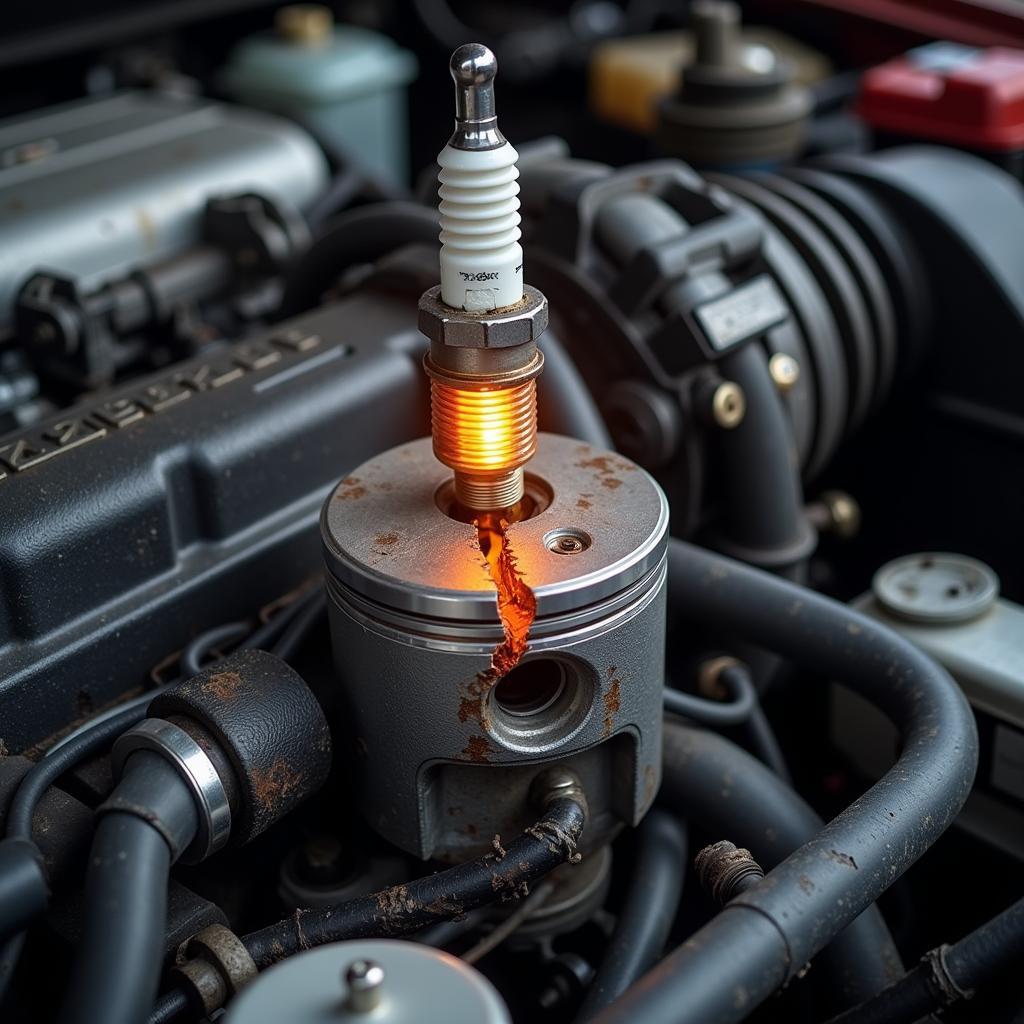Driving a car with misfiring cylinders can lead to a cascade of issues, impacting performance, fuel efficiency, and even causing further damage to your engine. If your engine isn’t running smoothly, it’s crucial to address the misfire promptly. Understanding the problems that arise from this common issue can help you avoid costly repairs down the road.
 Engine Damage Due to Misfiring Cylinder
Engine Damage Due to Misfiring Cylinder
One of the most immediate consequences of a misfiring cylinder is reduced power and acceleration. When a cylinder isn’t firing correctly, it’s not contributing its share of the workload, leaving the other cylinders to compensate. This can lead to sluggish performance, especially when accelerating or climbing hills. You might also notice a rough idle, where the engine vibrates excessively while the car is stationary. Furthermore, misfires often decrease fuel economy, as the engine works harder to maintain speed. Have you ever noticed a sudden drop in your miles per gallon? A misfiring cylinder might be the culprit.
How Misfires Damage Your Catalytic Converter
Another significant concern is the potential damage to the catalytic converter. Unburnt fuel from a misfiring cylinder can enter the exhaust system and overheat the catalytic converter. This can lead to a clogged converter, requiring expensive replacement. Ignoring a misfiring cylinder can essentially turn a relatively simple fix into a major repair bill.
Diagnosing and Addressing the Root Cause of Misfires
Addressing a misfiring cylinder requires identifying the root cause. Common culprits include faulty spark plugs, worn ignition coils, vacuum leaks, or issues with the fuel injectors. Sometimes, more serious problems like low compression or a damaged camshaft can be the underlying cause. A thorough diagnostic check is essential to pinpoint the problem accurately. Are you experiencing any of these issues? It might be time to take your car to a qualified mechanic. Check out our article on common engine problems in cars for more information: common engine problems in cars.
What are the common symptoms of a misfiring cylinder?
Common symptoms include rough idling, reduced power, decreased fuel efficiency, and the illumination of the check engine light. The car may also hesitate or stumble during acceleration.
The Importance of Regular Maintenance
Regular maintenance, such as replacing spark plugs and checking ignition coils, can prevent many misfires from occurring in the first place. Addressing minor issues promptly can save you from more significant problems down the line. Think of it as preventative medicine for your car.
“Regular tune-ups are crucial for preventing misfires,” says John Smith, a seasoned automotive technician with over 20 years of experience. “Catching these problems early can save you a lot of money and hassle in the long run.”
Conclusion: Don’t Ignore a Misfiring Cylinder
Driving with misfiring cylinders can lead to several problems, from reduced performance and fuel efficiency to costly damage to your catalytic converter and other engine components. Prompt diagnosis and repair are essential to avoid further complications. Don’t hesitate to seek professional help if you suspect your car is experiencing misfires. Remember, a small investment in maintenance today can prevent significant expenses tomorrow. Contact AutoTipPro at +1 (641) 206-8880 or visit our office at 500 N St Mary’s St, San Antonio, TX 78205, United States, for assistance with your automotive needs. Need more information on cylinder problems? Visit our page on cylinder problems cars.
“A misfiring engine is a warning sign that shouldn’t be ignored,” adds Sarah Jones, a certified automotive instructor. “Addressing the problem quickly is the best way to protect your investment and ensure your car’s longevity.”
You can also read about fuel delivery problems car and engine problems that can sideline a car for a deeper understanding of other potential car troubles. Looking for help with a car problem crossword clue? We can help with that too.






Leave a Reply